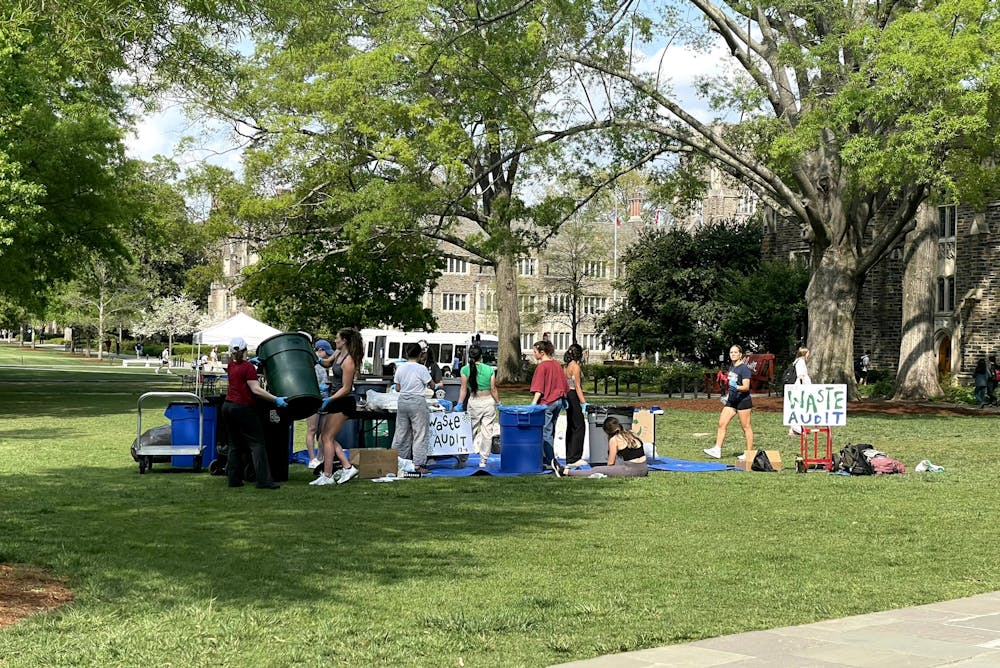Student volunteers helped sort through and categorize waste as part of Duke Environmental Alliance’s third annual waste audit project last week.
Environmental Alliance is Duke's undergraduate awareness and advocacy organization for the environment. The audit is meant to quantify how well Duke students and employees recycle and compost, and how much of each type of waste the University produces.The ultimate goal is to provide data and advocate for compost expansion on campus, according to Hailey Ross, a senior and one of the executives on the Waste Audit Committee.
Student volunteers gathered on April 6 on Abele Quad to sort through waste from public locations: BC Plaza, Zweli’s Café, The Devil’s Krafthouse, and The Loop. Once the waste has been counted and categorized, the organizers will work with the statistics department to analyze the results.
Last April’s audit found only 49.8% of recycling and 20.5% of compost is sorted correctly. The results of this year’s audit will be available on the Duke Spring Waste Audit website once tabulated. The overall contamination rate was 50.5% this year, compared to the 55% that last year’s audit found, according to Ross.
As volunteers arrived, Ross greeted them with vinyl gloves and sunscreen to protect from the sweltering afternoon sun.
“Right now you're looking at two tables, just fold out tables covered in plastic wrap; in between them are one recycling, one compost and one landfill bin,” Ross said, explaining the setup. The bins were colored blue for recycling, green for compost and black for landfill.
After hearing the instructions, the volunteers got to work on the pile of trash bags sitting on the quad. They sorted and counted the pieces of waste in each bag, weighing the bins to measure the change in weight between bags.
“Think of each of those as a little decision,” Ross reminded the volunteers as they sorted through the last few bits of trash at the bottom of a bag.
Duke Dining Sustainability Manager Kaitlyn Welzen was also on scene.
“I’m here just to help out,” Welzen said. “Duke Dining loves to support.”
After a question from one of the volunteers, Welzen explained the 10% rule to the volunteers: if a piece of recycling is more than 10% soiled, it has become trash.
Sophomore Abby Saks, one of the student volunteers, said that she wanted to help out to learn more about recycling on campus.
“People just don’t know what to recycle and what to compost,” Saks said. “When you're putting away your garbage, you can just see, there are green bins that are full of stuff that's not recyclable.”
As the volunteers learned more about recycling practices, they used the space to have conversations about waste and recycling. Some volunteers commented on the use of non-compostable take out boxes and ketchup packets, which were difficult to pick out of the food waste from The Devil’s Krafthouse.
The audit was also an educational opportunity for the public. A few passersby stopped to ask about what the volunteers were doing, and Ross welcomed the opportunity to share the audit’s mission with a touring family that stopped by.
The previous year’s audit, which Ross also contributed to, found that most people were not composting, with compost as the most missorted item.
“University resources are being wasted. We are just not being efficient about waste. The University can help that by increasing access and awareness about composting,” junior Shreya Joshi told The Chronicle at the time.
DSG’s Services and Sustainability Committee argued that this was due both to a lack of information provided to students on how to sort waste correctly as well as a lack of compost bins. There were no compost bins in 2021 on the Bryan Center Plaza, which is where all waste for last year’s audit was drawn from. Both the 2022 and 2023 audits were able to introduce temporary compost bins to the BC Plaza to give students the chance to engage with accessible front-of-house composting.
Get The Chronicle straight to your inbox
Sign up for our weekly newsletter. Cancel at any time.
At the time of last year’s audit, only Wilson Recreation Center, Brodie Recreation Center, Grainger Hall, Levine Science Research Building, Smith Warehouse, the Fuqua School of Business and limited Duke Dining locations were capable of composting. At the time, Duke Recycles said that the University lacked the capacity to expand this.
Correction: An earlier version of this article stated that the waste audits were part of Duke Student Government. It has been corrected to state that the waste audits are part of Environmental Alliance. An earlier version of this article stated that this was the second year of waste audits. It has been corrected to state that this is the third year of waste audits. The Chronicle regrets the errors.

Senou Kounouho is a Pratt sophomore and a university news editor of The Chronicle's 119th volume.

